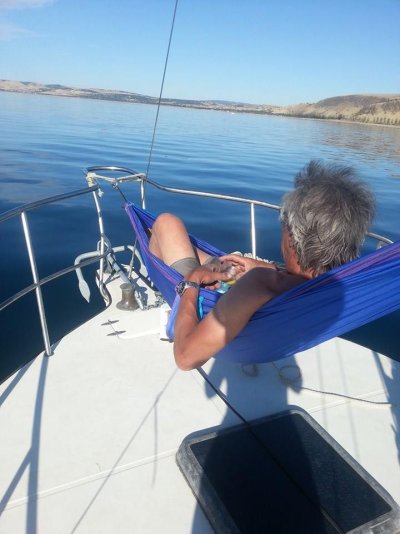1. I have no idea if the boats broached because they were on autopilot. I included this simply to show that Bellingham Bay can be a very nasty place and being able to control a boat in following seas is important. And these conditions can often overcome an autopilot pretty easily.
2. What typifies internet forums like this one is that discussions rapidly break down into talking about solutions that are in search of a problem. I think it was psneeld who said it best (I'm paraphrasing) that a lot of people spend a lot of time worrying and talking about potential effects with little time spent on thinking about avoiding these effects in the first place.
My skipper acquaintance may very well make Slocum look like a dirt farmer. I don't know much about Slocum so I have no way of judging that myself. What I do know, more from his acquaintences and crew members telling my than from hearing it from him, that his record of achievement on the BC coast is pretty impressive.
However, that doesn't count for much on the internet where there is no way to gauge credibility on forums like this. Your assumptions about how this fellow approaches operating a boat, what he's thinking about as he's operating it and how he interprets his situation and surroundings is no more valid than my assumption that, despite your having an impressive boat in pictures, you're just a toy boat operator like all the rest of us on this forum.
It's interesting to see how, based on a single photo I put up showing how this fellow sometimes likes to steer his boat when conditions warrant it, all sorts of assumptions are being made about this fellow's capabilities as a professional skipper by people who have never met him, and I suspect, have but a fraction of this fellow's expertise and knowledge (another assumption on my part, I agree).
It's also been interesting to see how what started out as commentary about why an autopilot is not always the best tool for the job has turned into accusations that some people are trying to make the case that an autopilot is not worth having and shouldn't be used.
I don't recall any of us who have pointed out the limitations of an autopilot--- me, Ron, Mark,and others--- saying that an autopilot is not worth having or should never be used, or that it's not a valuable tool on a boat when used intelligently.
So I'm going to leave it at this.... if one has an autopilot, it can be a great tool for enhancing safety and accuracy in driving the boat. BUT.... it's important to learn that there are times and conditions under which an autopilot is not the right tool to use, so the owner should learn how to operate his or her boat correctly and safely under those conditions.
But most important, people who have boats that don't have an autopilot should not be made to feel that they are the scum of the earth and they should never leave the protection of their marina. A boat without an autopilot can be operated just as safely and effectively and enjoyably as a boat that has an autopilot.
So... nice tool to have, and if you have one, take advantage of its benefits. If you don't have one, boating is just as safe and fun.
And now I have to go and direct a film about how we can turn the earth into a glass factory with the push of a button. Far more entertaining and fun than bickering about autopilots.



